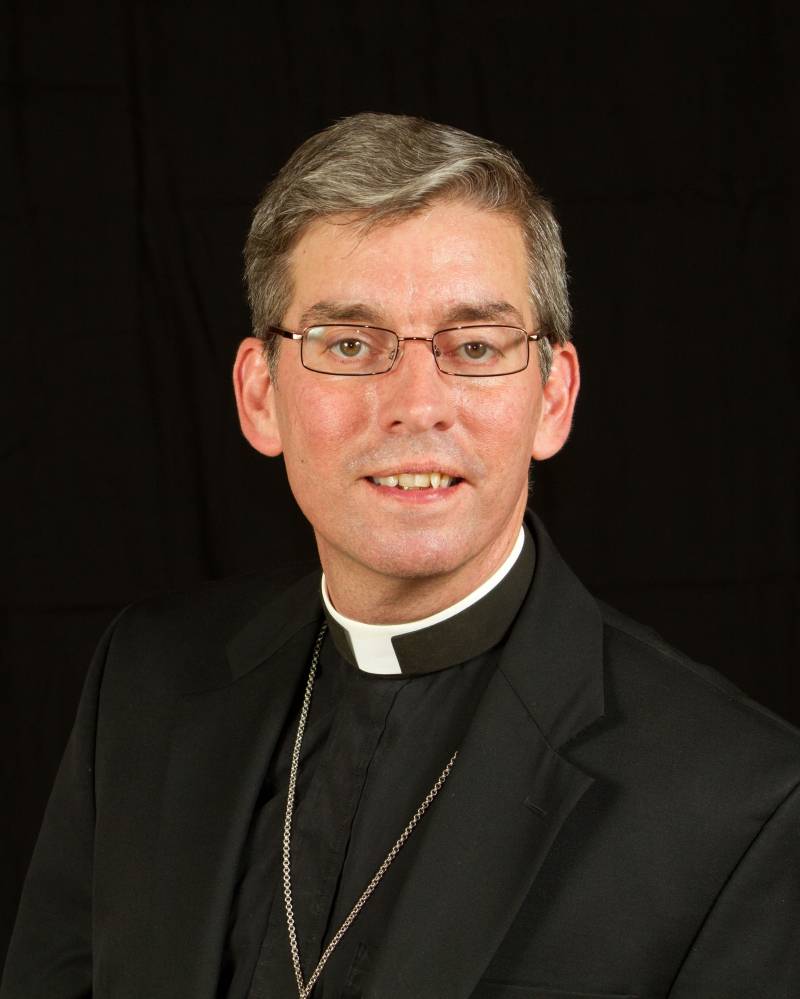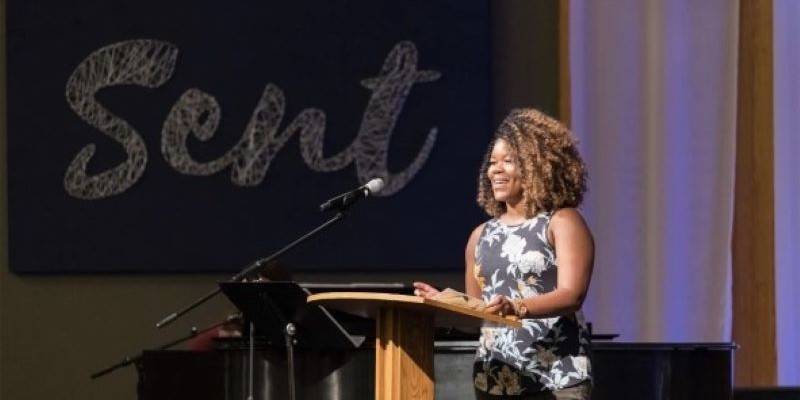I checked in with local clergy managing ministry and family matters in this Age of COVID-19. Here, we speak with Pastor Valena Claiborne of CU Church in Urbana and Pastor Chris Repp of Grace Lutheran Church in Champaign.
Pastor Valena Claiborne serves as the Executive Pastor of CU Church. Before being named Executive Pastor in January 2019, Valena was Outreach Minister at Windsor Road Christian Church, where she joyfully encouraged others to share God’s love within our community and to boldly engage the world.
After receiving her bachelor’s in applied sciences, from Lincoln Christian University, she continued on to obtain her Master’s in Fine Arts (2011), as well as her Ordination Certification which she obtained in December of 2017 under the study of Randy Boltinghouse. Valena identifies herself as a perfectly imperfect follower of Jesus, wife to her better half, and supermom to three.
Before being called to Grace Lutheran Church in Champaign in 2015, Pastor Chris Repp served for 12 years as pastor of Epiphany Lutheran Church in Carbondale and four years on the faculty of the Lutheran seminary in St. Petersburg, Russia where he taught church history and theology. He has a PhD in Russian History from the University of Illinois at Chicago and an MDiv from the Lutheran School of Theology at Chicago. He is married with three grown children.
Smile Politely: How are you and your family doing right now?
Pastor Valena Claiborne: We are doing well. Our kiddos and the hubs are healthy. We are very blessed by this time together. I have (in pure control freak fashion) come up with a colorful daily schedule for myself and the kiddos (I’m happy to share). It makes our days fly by and we love it!

Photo provided by Pastor Chris Repp.
Pastor Chris Repp: I am personally doing fine. I am concerned for my people, though, especially those in the more senior demographic. We have a dedicated food pantry staff that is still at work distributing food every Thursday, although we’re not allowing clients into the building to select their own food now. We’re putting together bags that we take out to them. We are working to replace some of our older volunteers with younger people from the congregation who suddenly find themselves with time for volunteering. I’m also concerned for folks who live alone. We’re making an effort to call all of them to check in and see how they are doing.
SP: How has required social distancing and sheltering in place changed your congregations?
Claiborne: Well, we are now offering services online each week. Our staff team is also taking time to call all our regular attenders to check in on them and offer prayer. Just being mindful to stay connected. I will say that the greatest significant change that I have noticed is that we are actually more connected than we were before. Unless a prayer request came through my email or God placed someone’s name on my mind, I only ever saw and spoke to folks on Sunday. But now, I’m spending so much more time with God that He is literally flooding my mind and my heart with the names of folks and I have been calling and writing to them everyday. This is who we were as a church, but now, the need of this kind of outreach is magnified.
Repp: We are a church that has a long tradition of taking science and scholarship seriously, and we are accustomed to thinking about our faith with the best of our intellectual tools. So we took seriously the early warnings from the WHO and the CDC. We stopped shaking hands with each other at the beginning of March, and went to online services only before the State of Illinois issued its Stay-at-Home order. I signed onto a statement by the Interfaith Alliance of Champaign County earlier this week announcing the commitment of our various communities of faith to follow the advice of our public health officials and refrain from in-person services until they are deemed safe again.
As far as adapting, we are learning as we go. Our first live-streamed service was done using an iPhone through Facebook Live, and the quality wasn’t great. Also, a fair number of our people had difficulty initially in accessing our service. We’ve since improved on both counts, adding a video camera and presentation software into the mix, and providing accessible video tutorials. We have also begun to incorporate pre-recorded cell-phone videos of our members reading the scripture texts for the services, which is helping to make the services feel more participatory. All of our meetings have gone online using the Zoom platform, and people are gradually learning how to use that too. In addition to meetings, we’ve had social gatherings by Zoom, too. For instance, our choir cannot rehearse at the moment, and we miss each other. So we met this past Wednesday after the service by Zoom. It was nice to see and hear everyone again. I am also doing some pastoral counseling by Zoom and telephone.
I want to stress that our live-streamed services are done by a minimal crew of six. Three of those are from the same household, my wife, my son, and I, who are the only ones down in front, and so don’t have to socially distance from each other. The other 3 are the sound technician, the video technician (also our music director) and our organist, who keep appropriate distance from each other in the choir loft, from where the service is videoed. All equipment, including the organ console, is regularly wiped down with disinfecting clothes, of which we still have an adequate supply.
SP: Pastor Repp, Will you continue to hold Taize prayer virtually or via Zoom or other platforms?
Repp: The Taizé service for April would have fallen on Easter Sunday, so we made the decision some time ago, before the current crisis, to cancel that service. May is still up in the air. Our lead guitarist has a family member with health concerns that they are having to be very careful with. The rest of us who lead that service are the same as those who lead on Sunday mornings, so it might yet be possible to livestream that service. My daughter, who was recently evacuated from her Peace Corps service and is completing her two weeks of isolation today, has a beautiful soprano voice and would also be able to join us for that. So we might be able to make that work. Ask me again at the beginning of May!
SP: What is this pandemic teaching you about faith and your faith community?
Claiborne: This is a reminder that we don’t run a darn thing! That God is in control. Honestly, I haven’t felt this peaceful in a long time. That tells me that the act of “being still” is something that I wasn’t doing as often as I should. This season is teaching me the importance of good ‘ol fashioned letter writing as I have found such joy in sitting down and writing a letter to various folks in our city.
Repp: The pandemic is reinforcing the importance of faith in God and the values of loving God and our neighbors that proceed from faith. It also exposes our sinfulness — our tendency to be selfish, and to turn away from God and neighbor, for which we continually need forgiveness even in the best of times. Our faith community has been very appreciative of our efforts to continue the work of the church under difficult circumstances, and has been very supportive and remarkably adaptable.
SP: As clergy, what advice would you give to those in our community struggling with questions of faith in this moment?
Claiborne: Talk about it! Do not be ashamed. Call up a friend or a local pastor and just talk about it. Ask the questions that are on your heart. Find someone that you can be vulnerable with and just start with a conversation. The cool thing is that God is waiting for us to want to know Him. As believers (clergy or not) we can all be the bridge that connects someone with Jesus! Amen??
Repp: That’s a difficult question with a long answer that we don’t have room for here, or the time. And that’s partly because there are many ways of struggling with faith that are particular to each individual. One of the more common, and more superficial questions that arises at times like this is, “how can God allow this to happen?” and the related declaration, “I can’t believe in a God that would allow this to happen.” It’s interesting to observe that such questions and objections to God tend to pop up only when a crisis becomes personal. Bad things are happening around us all the time. Not only infectious disease, but poverty, violence, war, discrimination, corruption, greed…the list is a very long one. Too often we are of a mindset that “life is good” when none of these things touches us (or we don’t notice that they’re touching us.) I find it more helpful to ask, “how can we — human beings, especially people of power and privilege — allow such things to happen, and what the heck is wrong with us that we do?” The proposition of my faith tradition is that God does indeed love the world, that God’s desire is for authentic and abundant life for all people, for the whole creation, and that God is at work right now, in and through the crucified and risen Jesus Christ, to make that desire a reality, in spite of all appearances to the contrary. That is the hope that the Christian faith clings to even in the face of death.
Top photo provided by Pastor Valena Claiborne.








